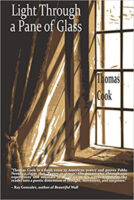Life and Death in ‘Light Through a Pane of Glass’
There is little between the word and the flesh in Thomas Cook’s daunting and terrifying Light Through a Pane of Glass. “There is perfection in the early dark / the smell of moist figs,” he writes in “Three Meditations,” yet life and death lurks beneath this observation, as it does beneath so many others in this debut collection.
Cook has been the editor and publisher of the longstanding journal Tammy and their chapbook press. His poems have appeared widely, and in several chapbooks, but until this collection there has not been a full understanding of his poetic project, which comes, anachronistically, on the heels of pastoral philosophers such as Lorine Niedecker and James Wright—this book features its own “Journey Westward,” has its own “deep water”—while it also pursues an existential agenda in poems such as “Two Figures”:
Afraid to accept a purer perception,
they busy themselves
with the intelligible world,
leaving much lost;
a thought, persistsAre we dearer in absence, you and I?”
Light Through a Pane of Glass will leave you thirsty in the Mojave Desert and abandon you to the Midwest. It is unflinching in the face of inheritance, addiction, and death. In it, you will smell figs, taste dates, and be grateful for afternoon onions. It will make you real.
Light Through a Pane of Glass by Thomas Cook. Big Table, 2020.
Reviewer bio: Nora Aronson is an MFA candidate at Warren Wilson College. Her first book, Instances of Calamity, was a finalist in the Uninterrupted First Book Contest. Her work has appeared in Bat City Review, Exhume Magazine, and Terra Firma.
Buy this book from our affiliate Bookshop.org.





